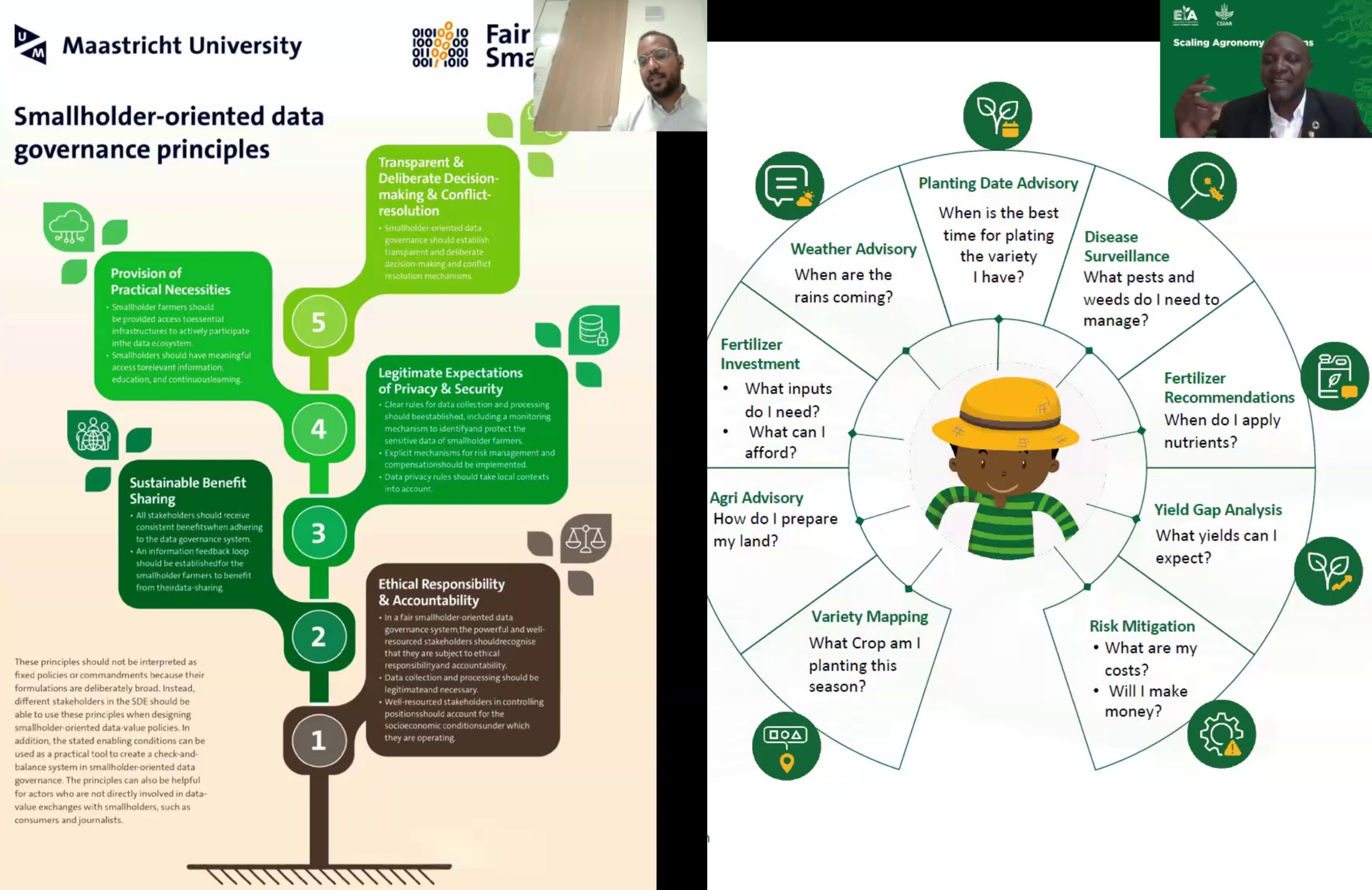Fair & Smart Data Research Spurs Crucial Discussions on Smallholder Farmer Data Governance
In a pioneering effort to address the challenges of smallholder data governance, the Fair & Smart Data research spearhead hosted an online event titled "Guiding Principles for a Fair Smallholder Farmer Data Ecosystem" on November 7th. This collaborative initiative involves Maastricht University, Rabobank, and Solidaridad, setting the stage for a series of events dedicated to exploring critical aspects of smallholder data governance, infrastructure, and integration.
Event Overview
The primary objective of the event was to foster insightful discussions among experts, practitioners, and decision-makers about the challenges surrounding the governance of the smallholder data ecosystem. The event began with an opening speech by Mandla Nkomo, Work Package Lead & Chief Growth Officer at CGIAR Excellence in Agronomy (EIA) Initiative, providing valuable insights to set the stage. Subsequently, three interactive panel discussion sessions were organised where attendees shared their expertise and opinions in a structured and collaborative manner.
Plenary Session
In a thought-provoking speech, Mandla Nkomo eloquently outlined the inevitable shift towards a data-driven economy. Drawing on insights from McKinsey's top technology trends for 2023, Nkomo emphasized that both farmers and their supporters must not only acknowledge but actively embrace this trend. He stressed the imperative of clarity regarding the farm data at hand, recognising the challenges in transitioning from raw data to actionable insights that genuinely benefit farmers. Nkomo underscored the crucial role of farmers themselves in shaping fair practices within the data ecosystem and advocated for a collaborative approach. He concluded by calling for creating scalable pathways with proper guardrails, ensuring a responsible and sustainable integration of data into the agricultural landscape.
Following the keynote speech, FSD researcher Sidi Amar discussed the conditions of smallholders globally, focusing on the governance issues surrounding their data. The presentation identified several challenges, including the lack of inter-governmental data governance frameworks, poor implementation of data regulations in the Global South, and asymmetry in power among stakeholders in the data ecosystem. Amar also highlighted new initiatives and developments, such as the European Corporate Sustainability Reporting Directive (EU CSRD), prompting discussions on farmer-centric data governance. The presentation concluded by introducing FSD data governance principles, covering ethical responsibility, sustainable benefit-sharing, privacy and security expectations, provision of practical necessities, and transparent decision-making.

Panel Discussions
After the plenary session, participants engaged in three parallel panel discussion sessions, each focusing on different aspects of smallholder data governance.
- In the first session, experts emphasized the need for standardisation of data, accessible and affordable tools for responsible data collection, and a supply chain approach. The importance of digital access at all levels in the supply chain and considering local context and language was also highlighted.
- The second session raised concerns about data commodification, neo-colonial data collection, and inequality in digitalisation. Discussions delved into the power dynamics of data governance, legal issues, and the role of consumers in influencing change.
- In the third session, the focus was on fostering consensus, determining initiative sources, and bringing farmers to the table. Participants discussed the importance of transparency, universal standards, and the need for multiple players with the power to drive change.
Closing Session
The closing session started with a recap from the moderators, followed by Ron Cörvers, FSD programme lead, highlighting the need for further research and development in the data ecosystem of smallholder farmers and outlining the common journey ahead. This includes feedback on FSD's guiding principles, pilot-testing them in practice, sector alignment on the principles, and the promise of more 'data-oriented' FSD events in the future.
The event concluded with a clear call to action, emphasizing the need for ongoing collaboration and research to ensure a fair and equitable smallholder farmer data ecosystem.
Event Recording
Also read
-
Study Smart gets Dutch Education Premium
Maastricht University's (UM) interfaculty educational innovation project Study Smart is one of the three winners of the Dutch Education Premium 2025. This was announced on Tuesday during the Comenius festival in The Hague.

-
Maastricht University recognised among top institutions in CEO Magazine’s 2025 Green MBA Rankings
We are proud to share that Maastricht University School of Business and Economics has been recognised as a top-ranked institution in the CEO Magazine 2025 Green MBA Rankings.

-
Language policy in European higher education
The increased Englishization of higher education is under discussion in several European countries. What does a balanced language policy look like that does justice to both the increasingly international character of higher education and a country's language-related cultural identity? At an...
